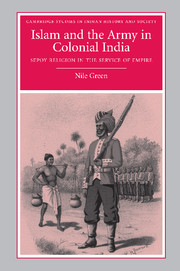Book contents
- Frontmatter
- Contents
- List of illustrations
- Preface and acknowledgements
- A note on terminology
- Glossary of Urdu and Anglo-Indian terms
- Map Nizam's State and its cantonment towns
- Cambridge Studies in Indian History and Society
- Introduction
- 1 Traditions of supernatural warfare
- 2 The padre and his miraculous services
- 3 Allah's naked rebels
- Conclusions
- Notes
- Bibliography
- Index
Conclusions
Published online by Cambridge University Press: 29 July 2009
- Frontmatter
- Contents
- List of illustrations
- Preface and acknowledgements
- A note on terminology
- Glossary of Urdu and Anglo-Indian terms
- Map Nizam's State and its cantonment towns
- Cambridge Studies in Indian History and Society
- Introduction
- 1 Traditions of supernatural warfare
- 2 The padre and his miraculous services
- 3 Allah's naked rebels
- Conclusions
- Notes
- Bibliography
- Index
Summary
We know something of the barrack life of an English soldier – what do we suppose that of a sepoy is like?
‘Jack Sepoy’, Fraser's Magazine (1856)The character of barracks Islam
In reconstructing the careers of Afzal Shāh and Banē Miyān, the previous chapters have examined the different ways in which Muslim holy men were associated with the armies of the British Empire and their Muslim soldiers in Hyderabad. Given the specificity of the stories we have heard, it is now time to step back and draw conclusions concerning the processes by which the careers of the faqīr leaders of barracks Islam were made. While one of the intentions of this book has been to restore something of the individuality and idiosyncrasy of the nameless sepoys who made up the anonymous masses of the colonial army, it is no less important to ascertain the wider processes through which the sepoys' Islam interacted with the armies of empire. Whether these processes can be seen as applying to the lives of soldiers in other parts of India is for subsequent research to decide. Our conclusions focus on the three main issues that have emerged from the details of Chapters 2 and 3, namely the defining characteristics of barracks Islam; the role of military institutions in the promotion of this Islam; and the obverse question of role of military institutions in repressing or reforming it.
- Type
- Chapter
- Information
- Islam and the Army in Colonial IndiaSepoy Religion in the Service of Empire, pp. 136 - 149Publisher: Cambridge University PressPrint publication year: 2009



